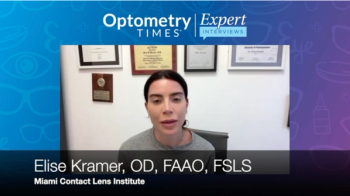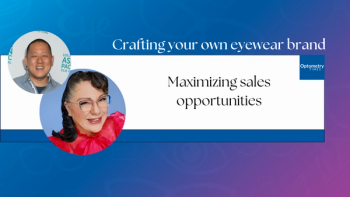
1 800 Contacts now offers Opternative refraction to its customers
1-800 Contacts will begin offering the Opternative online refraction service to its customers on its website, branding the partnership as “InstaRx powered by Opternative.”
Chicago-1-800 Contacts will begin offering the
The site invites potential users to “stay home, eat some ice cream, and get a vision exam” to get their “prescription contacts online.”
“1-800 Contacts is dedicated to providing customers with more choice, greater convenience, and lower prices,” Kellen Fowler, director of business development with 1-800 Contacts told Optometry Times. “We believe that Opternative’s technology can help extend the reach of eye doctors, improving access for patients and making the process of renewing a contact lens or glasses prescription easier.”
Opternative CEO Aaron Dallek told Optometry Times that the company has been in talks with 1-800 Contacts for some time, but 1-800 Contacts began reviewing and testing the Opternative technology about a year ago.
“Over the last year, we’ve gotten 1-800 Contacts comfortable with our technology,” he says, “and we’ve worked out a partnership that we feel is going to make eyecare services more accessible and affordable to all of their patients.”
Related:
The service will be available
Theoretically, a patient could say he lives in a different state if the service is banned in his home state.
Opternative has no way to prove in which state the customer is located, so the company must rely on its customers telling the truth just like a doctor would have to trust that a patient is being truthful in an exam, Dallek says.
Related:
Optometry’s rivals team up
The deal brings together two companies which have plagued organized optometry. The American Optometric Association (AOA) and other optometric organizations have fought both Opternative and 1-800 Contacts at the state and federal level.
Earlier this summer, we wrote about
Meanwhile, the optometric community has taken issue with the company’s tactics to obtain these prescriptions and says it is not uncommon for the prescriptions to be expired.
Related:
This deal, it appears, would allow 1-800 Contacts and its customers to bypass this step and obtain a new prescription without a comprehensive eye exam. And this, many ODs say, is dangerous to patient health.
Jeffrey Sonsino, OD, FAAO, chairman of the AOA Contact Lens and Cornea Section (CLCS), called the partnership unethical and says Opternative and 1-800 Contacts are deceiving patients into thinking they are receiving an eye exam and a contact lens fit.
“Having a practitioner download data gathered by historical contact lens use-the scheme devised by Opternative-is in no way comparable to a doctor’s close inspection of how the contact lens is impacting the physiology of the cornea and conjunctiva, as is done in an actual contact lens examination,” he says.
Dr. Sonsino says the partnership is 1-800 Contacts’ attempt to skirt the rules that it sees as a barrier to completing a sale.
So, what happens if a patient who utilizes the InstaRx service develops a pathology that would have been diagnosed during a comprehensive eye exam? Dallek says the company has medical malpractice insurance to cover their doctors and patients.
Healthy eyes or healthy bottom lines?
AOA has not yet released an official statement on the deal, but Dallek says he remains hopeful that optometrists will someday be willing to partner with Opternative and bring the technology into their own practices.
Opternative and other disruptive eyecare technology companies have expressed similar desires in the past,
“My hope is that we can begin a dialogue,” says Dallek. “That’s been my hope since we started this-and we figure out a way we can work together and make it easier for patients to access eyecare services, making sure patients take care of their eyes on a regular basis.”
Related:
For now, that optimism may be misplaced because the optometrists who spoke with Optometry Times following the announcement did not have kind words to share about the company or its latest partnership.
“It is interesting to see how for-profit enterprises such as 1-800 Contacts and Opternative can put the nation’s population at risk for health problems,” says Optometry Times Editorial Advisory Board member David Geffen, OD, FAAO. “Their desire for profit in the name of consumerism is a sales pitch that is dangerous.”
Optometry Times Editorial Advisory Board member Justin Bazan, OD, agrees that the companies are putting profits ahead of patient safety.
“Providing contact lens prescriptions without performing a contact lens exam is dangerous,” he says. “I make it a point to educate my patients about what I'm doing during their exam and why it’s important to them. Hopefully, the message resonates with them, and they will choose my care instead of an app.”
Dr. Bazan recently shared why he believes some patients are choosing to get their prescriptions online instead of in your practice. You can read his advice for getting patients offline and back in your chair
Related:
Opternative has faced criticism from the optometric community over the safety of its service since its inception. Dallek maintains that the company’s main focus is not taking business away from practitioners but rather to provide convenient, inexpensive access to eye care.
While ODs have voiced concerns that InstaRx will endanger the ocular health of contact lens wearers, Dallek and Fowler both argue the opposite.
“We believe that making the prescription renewal process more convenient and affordable can help reduce the incentive for customers to stretch their use of contacts beyond the recommended wear guidelines,” Fowler says, “which should ultimately lead to better eye health.”
But ODs remain adamant that the companies care more about the health of their bottom lines than the ocular health of those they serve.
“This partnership obviously has nothing to do with health,” says Optometry Times Editorial Advisory Board member Alan Glazier, OD, FAAO. “Updating medical prescriptions at home is only in the best interest of 1-800 Contacts, which has consistently sought ways to commoditize contact lenses, even at the expense of the health of those who wear these products.”
Newsletter
Want more insights like this? Subscribe to Optometry Times and get clinical pearls and practice tips delivered straight to your inbox.













































